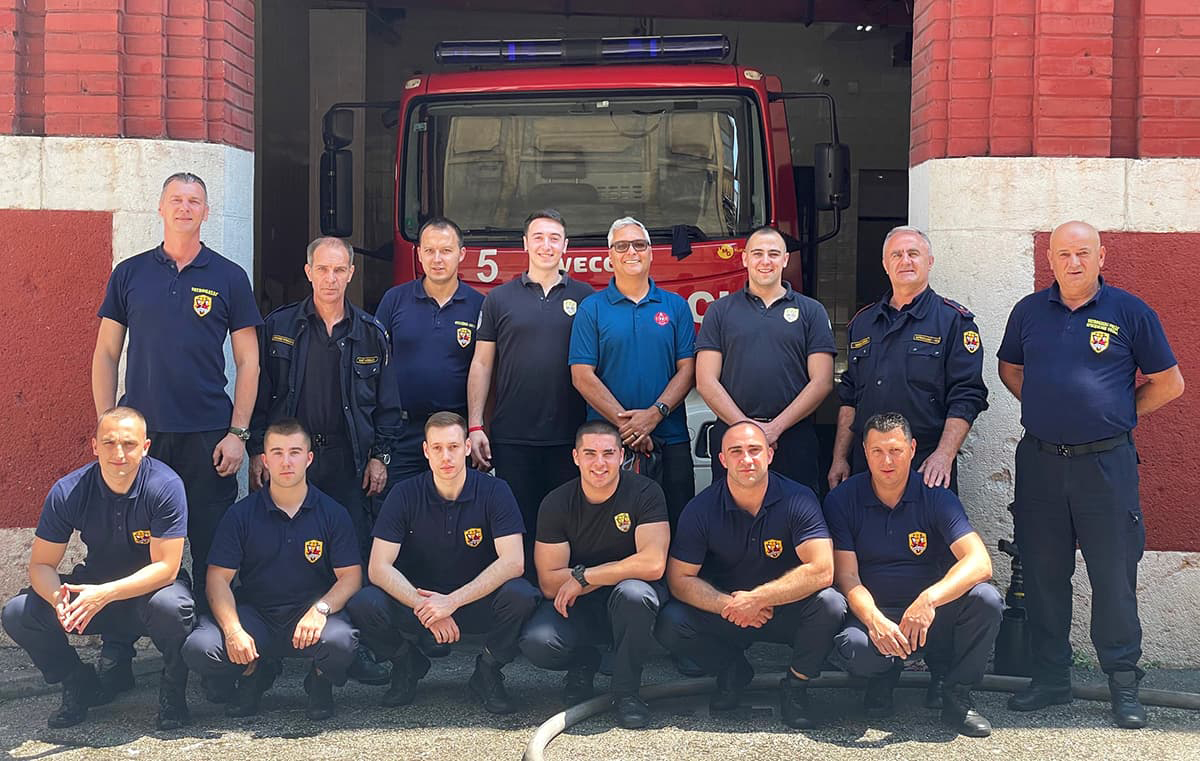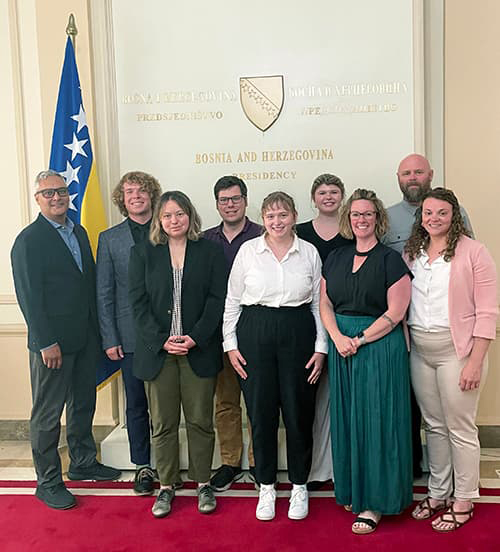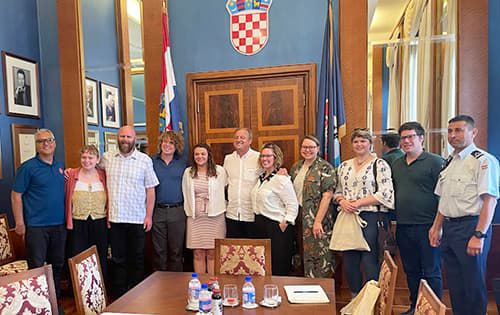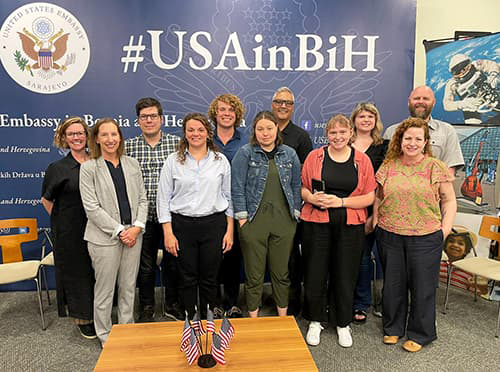Becoming a Better Human Through Travel
Scholarships for a Study Abroad Trip to the Balkans Made All the Difference for Chris VanDijk
Madeline Levin | Office of Advancement Nov 15, 2024
Four days a week, Chris VanDijk is hard at work on his capstone on evaluating fire department policies for his master's in public policy (MPP) degree. Other days, he is serving as a firefighter and driving his teenage son across Denver.
Chris was inspired to enroll at CU Denver by a combination of his wife's job in the bioengineering program at CU Anschutz and an International Association of Firefighters trip to Washington D.C. to lobby representatives. "As I was sitting in Senator Bennet's office," Chris says, "I looked around the room and thought—to quote Hamilton—'I'm in 'the room where it happens.' I've always wanted to go back to school, but I wasn't quite sure what I wanted to do, and [my wife] happened to pass on the School of Public Affairs' information, where they had just started an MPP program. I did a little research on the program itself and decided to jump in."

Overcoming Impostor Syndrome
While Chris is happy to be at CU Denver, he couldn't be more grateful for the opportunity of attending a School of Public Affairs (SPA) three-week study abroad program in Bosnia and Croatia in Summer 2024. Funded through a Finish Line scholarship—a program supporting both graduate and undergraduate students—this study abroad trip countered the “Impostor Syndrome" Chris experienced from going back to school at age 50. "You look around the room and kids are hammering things out, and I'm thinking, 'I was a theater student,'" he laughs, recalling that during his undergraduate years, he used typewriters. “This study abroad trip helped me push past that doubt, and it made me feel like I fit in and belonged in those rooms,” he explains. “I could hold my own having those conversations with academic and political leaders."
Like most study abroad students, Chris appreciated the immersion into Southeastern European culture. "It was an opportunity to experience a different place in a unique way," he says, explaining how his 'Instagram Takeover' for the trip looked different from his peers’ abroad programs. While his classmates were enjoying the beach, Chris relished the classroom. "It was a really different dynamic," he explains. "We took the 'study' portion of study abroad more seriously." He credits this academic diligence to SPA’s Associate Dean, Dr. Annie Miller.
Deeply Immersive Experiences
Dr. Miller explains that the program Chris attended focused on "ethnic politics, political identities, and the influence ethnic coalitions have on policy making across the Balkans and allows students to engage high-level government and NGO officials on challenging topics like economic development, housing, human trafficking, and post-war reconciliation." She acknowledges the need for funding study abroad programs for graduate students “to have deeply immersive experience that fundamentally change how they see themselves." "This intentional funding model gives students just a little nudge or support to stay in school during this challenging period toward the end and complete their degree, and we know that experiences like study abroad lead to higher retention and graduation rates," she says.
But supporters of scholarships like Finish Line can expect to see their impact on two different levels. "First, the student who receives this support may be able to reduce hours worked in a job or reduce stress associated with financial burdens in order to complete the program and focus more deeply on the more difficult courses they take as they progress," Dr. Miller explains. "Second, there is societal-level value in the recognition that student loan borrowers who do not complete a degree are three times more likely to default on that debt and have to work their way out of bankruptcy. There are systemic and personal gains to investing limited resources with this student population than with students earlier in their careers." 
Focus on the Community
Throughout his study abroad trip, Chris kept the same question in the back of his mind: how are we helping our community grow? He explains that "ultimately, we can help grow safer communities, allowing for the more effective use of resources and efficient response." As a firefighter, Chris keeps this sentiment at the forefront of his work. "I'm looking at how [Croatians in Zadar] are managing with one fire department that's the size of mine [in Commerce City, Colorado]," he marveled, adding that Zadar’s population is about the same as the Denver metro area.
One of 90 firefighters across five stations in Denver, Chris is engineer of Tower 24 on a four-man crew—two firefighters and an officer. A firefighter for almost 11 years, he finds Zadar's practices to be unique given that the homes are built from brick and concrete, making house fires rare. "There's infrastructure in there that's very different," he says. "We really had to put our noses to the grindstone because it was a lot,” he says. “To soak up the histories, to soak up the locations, to look at two places that went through the same conflict and took a very different path—it was such an interesting thing to go from one country to the next."

The Benefits of a Global Perspective
When asked what he would like to say to the donors who make his scholarship possible, Chris clasps his palms together in a moment of gratitude. Smiling, Chris says, "Thank you," and explains that he never had the opportunity to study abroad while working towards his bachelor's degree. "[Studying abroad] wasn't something I just wanted to do; it was something that was important to do. The scholarship itself made it happen," he says. "No donation amount is too small. It all adds up. And there is no amount that's too large," he jokes. "Travel makes us better humans. Learning about other cultures makes us better humans. Being able to see through that lens simply makes you a better human being.”
To anyone considering making a gift to CU Denver, Chris has a message: "Providing a student with the opportunity to see the world through a different lens is better for democracy. You get a chance to create a better human."